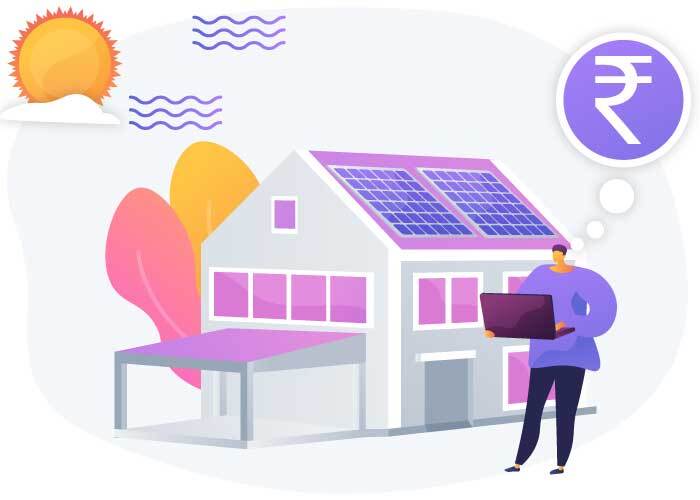When sunlight transforms into savings and rooftops become power sources, you’re entering the world of solar energy. Curious about the cost of installing solar panels for home and the intricate factors shaping it? Look no further.
At KCP Solar, we’re your guides through the intricate landscape of solar power. We’re here to demystify the cost of installing solar panels for home use and delve into the underlying elements. From the panels that capture sunlight to the cables that transmit power, we’re with you every step of the way. Let’s dive right in!
Types of Solar Panel Systems: Understanding Your Options
A solar panel system is a complex arrangement of components designed to generate and supply solar power for your household needs. There are three main types of solar systems:
On-Grid Solar Panel Systems: These are connected to the grid and do not incorporate batteries.
Off-Grid Solar Panel Systems: Designed with batteries, they operate independently of the grid.
Hybrid Solar Panel Systems: Combining batteries and grid connectivity, they offer the best of both worlds.
In India, the on-grid solar system is most prevalent for residential use due to its efficiency and convenience.
Components of a Solar Energy System
A solar system is comprised of several key components, each playing a unique role in ensuring efficient power generation:
Solar Panels:
These panels serve as the energy receptors, capturing sunlight and transforming it into direct current (DC) power. Sunlight excites electrons within the panels, generating an electric current.
Mounting Structures:
The platform on which solar panels are mounted plays a crucial role in their efficiency. Mounting structures are strategically designed to minimize shadows cast on the panels, ensuring maximum exposure to sunlight throughout the day.
Solar Inverter:
As solar panels generate DC power, the solar inverter steps in to convert this DC power into alternating current (AC), which is the type of electricity used by most household appliances. This conversion allows seamless integration with your home’s electrical system.
DC and AC Combiner Boxes:
These boxes act as gatekeepers for the power transmission process. DC combiner boxes ensure the safe isolation of direct current cables, while AC combiner boxes protect against electrical surges and other potential hazards related to alternating current cables.
Solar Accessories:
These additional components contribute to the overall efficiency and safety of the solar system. Conduit trays and pipes house the cables, ensuring organized and secure transmission. Earthing cables ground the system, preventing electrical hazards. Lightning arresters safeguard against voltage spikes. Connectors, such as MC4 connectors, facilitate the seamless flow of current.
Exploring Solar Panel Types
Solar panels vary in design and composition, impacting their efficiency and performance:
Polycrystalline Solar Panels:
These panels consist of multiple silicon crystals and offer an efficiency range of 16-17%. They are cost-effective and versatile, making them a popular choice.
Monocrystalline Solar Panels:
Crafted from a single silicon crystal, monocrystalline panels boast higher efficiency, ranging from 19% to 21%. Their uniform appearance and efficiency make them sought after.
Bifacial Solar Panels:
These advanced panels have cells on both sides, capturing sunlight reflected off surfaces. With efficiency up to 22%, they are exceptionally productive, though costlier.
Thin-Film Panels:
These panels use a thin semiconductor material and are less common due to lower efficiency. They are more flexible and can be applied to curved surfaces.
The Impact of Mounting Structures
Mounting structures are pivotal in solar installations. They support panels and affect their exposure to sunlight. Key considerations include
- Type of mounting structure (steel for RCC rooftops, aluminum for metallic sheet rooftops).
- Optimal tilt angle based on geographical location.
- Taller structures minimize shadow interference.
- Unveiling the Solar Inverter’s Role
Solar inverters convert DC power to AC, enabling household appliances to function. Types of inverters include:
- String Inverters: Common and cost-effective.
- Micro-Inverters: Latest technology, slightly more expensive.
Cables and Combiner Boxes
DC and AC combiner boxes isolate cables for safety. Cable lengths and quality influence installation costs.
Additional Factors Affecting Installation Costs
- Project capacity and scale.
- Installation type (height and locality).
- Choice of panels, inverters, and mounting structures.
- Cable length.
- Value-added services and maintenance contracts.
Understanding Solar Panel Installation Costs in India
The installation cost varies due to project-specific factors. Without subsidies, the approximate range for different capacities is:
1 KW system: ₹70,000 to ₹1,10,000
2 KW system: ₹1,40,000 to ₹1,80,000
3 KW system: ₹1,80,000 to ₹2,40,000
4 KW system: ₹2,40,000 to ₹3,20,000
5 KW system: ₹3,00,000 to ₹4,00,000
10 KW system: ₹6,00,000 to ₹8,00,000
The Role of Solar Installers
Solar installation companies handle various tasks, including rooftop inspection, module selection, and installation, among others.
Why Choose KCP Solar?
At KCP Solar, we’re not just another solar installation provider – we’re your dedicated partners in the journey towards clean, sustainable energy. Here’s why choosing us for your solar panel installation is a decision you’ll be glad you made:
-
Expertise That Guides You:
Our seasoned experts bring years of experience in the solar industry to the table. We understand the intricacies of solar energy systems, and we’re here to guide you through every step of the installation process. Whether you’re new to solar power or seeking to upgrade your existing setup, our expertise ensures a seamless transition to solar energy.
-
Tailored Solutions for Your Needs:
We recognize that every homeowner’s energy needs are unique. Our approach is not one-size-fits-all – we take the time to understand your requirements, energy consumption patterns, and goals. This allows us to design a customized solar solution that maximizes your energy savings and minimizes your carbon footprint.
-
Transparency in Pricing:
We believe in transparent communication, especially when it comes to costs. Our quotations for solar panel installation are comprehensive and easy to understand. You’ll know exactly what you’re paying for, without any hidden charges or surprises down the line. Our goal is to help you make an informed decision that aligns with your budget.
-
Quality and Reliability:
We’re committed to delivering top-quality products and installations that stand the test of time. We source solar panels, inverters, and components from reputable manufacturers with a proven track record of reliability. Our installations are carried out by skilled professionals who prioritize safety and precision.
-
Continuous Support:
Our relationship doesn’t end with installation. We offer ongoing support and maintenance services to ensure your solar system operates at its optimal efficiency. Our Annual Maintenance Contracts (AMCs) give you peace of mind, knowing that your investment is protected and well-maintained.
Choosing KCP Solar means more than just installing solar panels – it’s a commitment to a brighter, greener future. Let us be your trusted partner in harnessing the power of the sun to create a sustainable and energy-efficient home. Contact us today to embark on your solar journey and experience the KCP Solar difference firsthand. Together, let’s pave the way for a cleaner and more sustainable world.
Conclusion: Embrace Solar Power
As you delve into the world of solar energy with KCP Solar, you’re not only making an eco-conscious choice but also tapping into potential financial advantages. With solar subsidy in Tamil Nadu, your journey towards sustainable power becomes even more rewarding.
The government’s support empowers you to adopt solar technology while enjoying economic benefits. So, seize this opportunity to not only reduce your carbon footprint but also harness the solar subsidy in Tamil Nadu to make your transition to clean energy even more cost-effective. Join us in embracing a brighter, greener future today.


 from Webdoux
from Webdoux